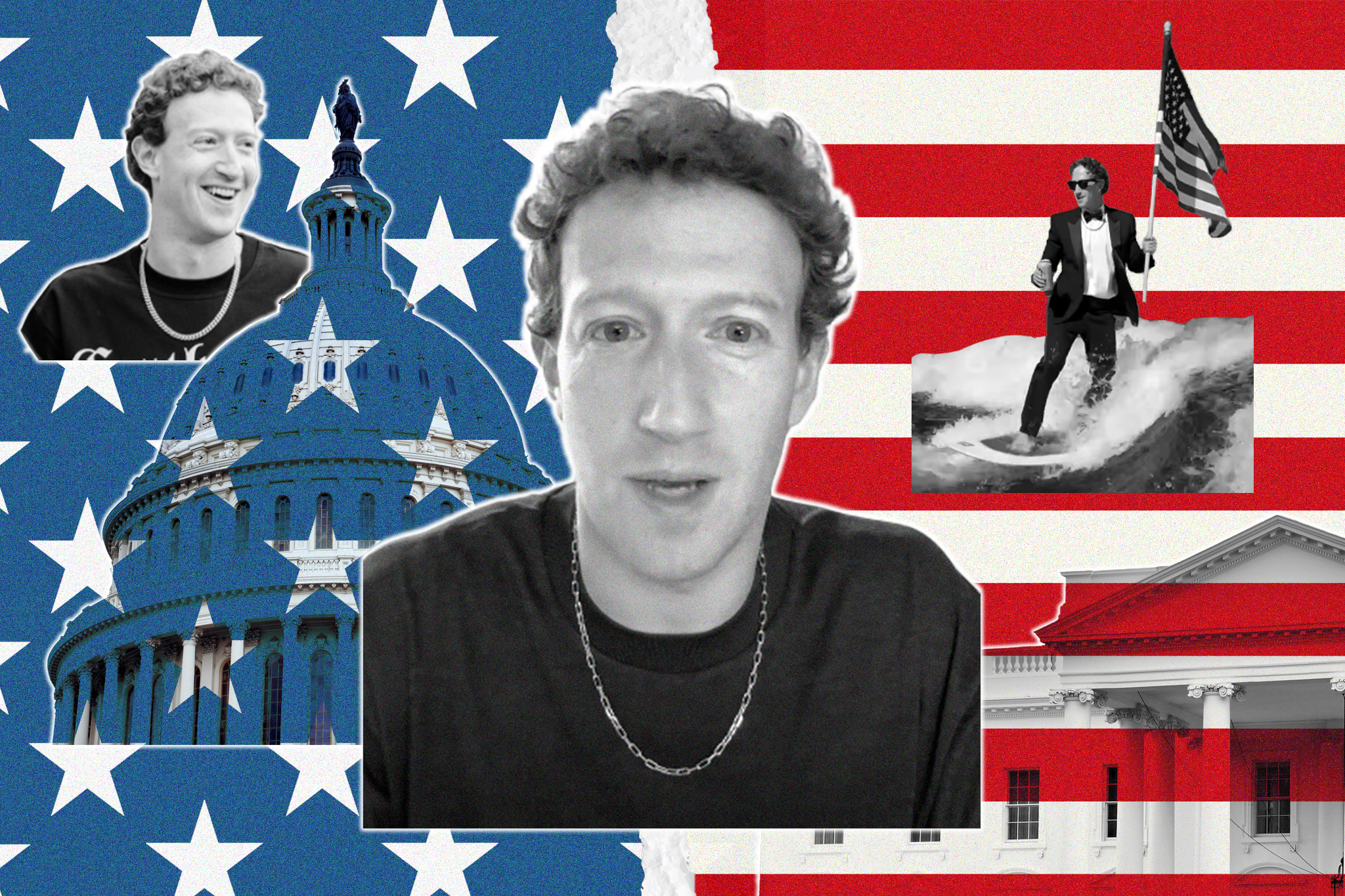From liberal darling to phone calls with Trump: Mark Zuckerberg’s political transformation
The CEO, chairman, and controlling shareholder of Facebook’s parent company Meta says he wants to be ‘non-partisan’. But that’s not so easy when you’re a monarch in all but name, reports Io Dodds


Sitting onstage with the hosts of a popular Silicon Valley podcast in front of more than 6,000 paying customers last month — and decked out in his new custom-designed wardrobe — Mark Zuckerberg looked entirely at ease.
"I was thinking to myself, we might need to book the next one of these for all the things I’m going to have to apologize for that I’m going to say tonight," he joked.
Then, just as one of the hosts was about to launch into his first question, he added: "Nah, just kidding. I don’t apologize anymore."
That got a big laugh, but the Facebook founder’s tone was rather different one month earlier when he wrote to a Republican committee chairman in the US Congress to reveal how the Biden administration had pushed for his company to censor more posts about Covid-19.
"I believe the government pressure was wrong, and I regret that we were not more outspoken about it," Zuckerberg said, adding that his crew had "made some choices that... we wouldn’t make today". A cynic might call that something like an apology.
This is the paradox of Mark Zuckerberg’s recent political transformation. Along with his new threads, the CEO and controlling shareholder of Meta, Inc – the $1.4bn social media behemoth that owns Facebook, Instagram, WhatsApp, as well as the Quest line of virtual reality headsets – has begun striking a new tone on matters electoral.
Having once taken a harsh line against Covid misinformation and Donald Trump’s election conspiracy theories, and used his vast personal wealth to fund left-wing causes, the 40-year-old now says he wants Meta to be "nonpartisan".
He has reportedly abolished Meta’s dedicated election integrity team, cut its once-regular election year "war room", canceled transparency tools used by journalists to track misinformation, and down-ranked political content in his apps’ news feeds. He is also said to have cut back his philanthropic foundation’s political activities.
Meanwhile, The New York Times reported last week that Zuckerberg has called Trump twice to try and patch up their relationship, and has been telling people close to him that his politics are now more "libertarian" or "classical liberal" than progressive. In July, he publicly described Trump’s reaction to his assassination attempt this July as "one of the most badass things" he’d ever seen.
So where exactly is Zuckerberg going with all this? And where is it coming from?
"I see it as more of a shift of his approach to politics versus a shift in his own politics," Katie Harbath, a former Republican Party operative-turned-consultant who led Meta’s political engagement and election efforts between 2011 and 2021, tells The Independent.
"After many years of trying to appease regulators and politicians, and finding that he couldn’t win either way, he’s now doing a ‘pull back’ response of just not wanting to be involved in it at all... Mark is swinging from one extreme to the other, from 2020 to 2024."
‘Almost every institution has become partisan’
There was a time when Zuckerberg wore his politics on his sleeve.
In 2015, alongside his wife Priscilla Chan, he set up a charitable foundation and began plowing money into progressive causes such as drug legalization, raising California’s property taxes, and creating a pathway to citizenship for undocumented immigrants (as well as less politicized areas such as medical and scientific research.)
Then, in 2016, the Cambridge Analytica scandal plunged Meta into what would turn out to be a permanent state of political besiegement. Over the next four years, in what has since been dubbed "the techlash", politicians across the world began holding Big Tech’s feet to the fire over issues that had long been building: data privacy, political bias, teenage mental health, eating disorders, failures of age verification, promoting extremism, and even enabling genocide.
In 2020, in the shadow of mass death, Meta and other Silicon Valley firms took an unprecedentedly strong stance against Covid misinformation and, eventually, Trump’s attempt to overturn the election. Conservatives were furious, and hammering Big Tech became a fully cross-partisan phenomenon.
According to The Times, Zuckerberg was confused and disturbed by these shifts. Starting in 2019, he "expressed bewilderment" about the state of American politics. He was, reportedly, especially embittered by the massive Republican backlash to his and Chan’s $420m donation to an election infrastructure non-profit to help more people vote safely in the 2020 election.
Trump called the project "fraud" and "cheating", GOP senator Ted Cruz said it was an example of "billionaires buying elections"; and dozens of red states moved to ban such donations. In fact, later investigations found that these "Zuckerbucks" did not affect the outcome of the vote.
It is, frankly, downright strange that someone as intelligent as Zuckerberg would be surprised by any of this. Disingenuous moral panics stoked by partisan hacks – often incentivised and rewarded by social networks such as Facebook – are common in American politics, and Trump has supercharged that dynamic. Any billionaire who is sincere and committed in their philanthropy should, by now, be prepared for the inevitable backlash.
Regardless, Zuckerberg reportedly became disenchanted with the entire arena. He now believes that many criticisms of Meta were unfair, and that the company’s public gestures of contrition merely made it "a weak target for people who are looking for a source of blame". (Most of said critics would contend that the company’s repentance was never more than skin-deep.)
"Almost every institution has become partisan in some way, and we are just trying to resist that," Zuckerberg told tech news site The Verge last week. "And maybe I’m too naive, and maybe that’s impossible, but we’re going to try to do that."
‘You can run from politics, but you can’t hide’
To Roger McNamee, though, all of that sounds like a bunch of crap.
"Mark’s statement that somehow he has been wronged by politicians is ridiculous," says the 68-year-old venture capitalist. "Facebook has been the beneficiary of a total lack of government regulation... [H]e has been allowed to do whatever he wanted, without regard for the consequences."
McNamee was one of Facebook’s earliest investors and once served as a mentor to Zuckerberg, persuading him not to sell the fledgling start-up to Yahoo even at a bonanza price. Later, he became a vocal opponent of the company after trying and failing to warn Zuckerberg about Russian interference in the run-up to the 2016 election.
"You would be well-served to take everything that Mark is saying as a desperate attempt to change the subject so as to avoid accountability," he tells The Independent, pointing out that Meta’s share price is now at an all-time high despite the turbulence of the techlash and the pandemic.
In his view, Meta’s political woes aren’t the result of poor crisis management or a failure to understand America’s changing politics. They’re a direct and predictable consequence of the company’s bad behavior. And now that society is waking up to those problems, he argues, Zuckerberg is feeling the heat.
Even if you disagree, this entire situation is fundamentally one that Zuckerberg sought out. He is the one who chose to ruthlessly expand Meta’s services across the world until it became something like a government, and to consolidate his power over the company to the point where he is effectively its king.
This is an institution that profoundly shapes what up to 3.3 billion people see on their screens every day, as well as the rules to which they are held when they post their opinions online. Meta doesn’t make car parts or corn dogs or toy baby dinosaurs. It is, because it chose to be, the venue for an enormous share of Earth’s political conversations.
In other words, when you make yourself a lightning rod for political controversy, you shouldn’t be surprised that you can’t persuade the lightning not to strike.
In any case, Harbath points out that Zuckerberg is not actually disengaging from politics, since he continues to speak out on issues such as AI regulation that directly affect his company.
"He’s trying to have his cake and eat it too a little bit on this. But ultimately, he’s just trying to avoid getting sucked into the political fray," she says.
Will it work? "No. It won’t work," says Harbath. "You can run from politics, but you can’t hide. I think he’s going to keep getting pulled into it."
For an example, look no further than Trump’s recently-published coffee table bookSave America, in which he describes Zuckerberg and Chan’s election infrastructure donations as "a true PLOT AGAINST THE PRESIDENT".
"We are watching him closely," Trump wrote, "and if he does anything illegal this time he will spend the rest of his life in prison – as will others who cheat in the 2024 presidential election."
So: no pressure, Mark.
Join our commenting forum
Join thought-provoking conversations, follow other Independent readers and see their replies
Comments